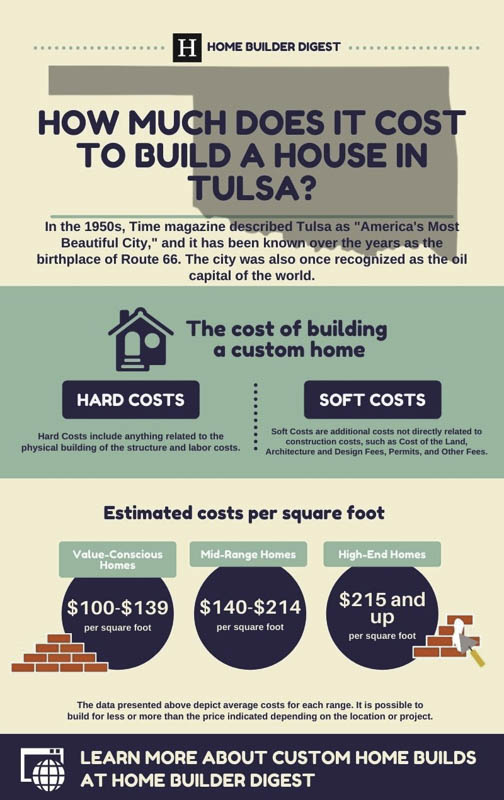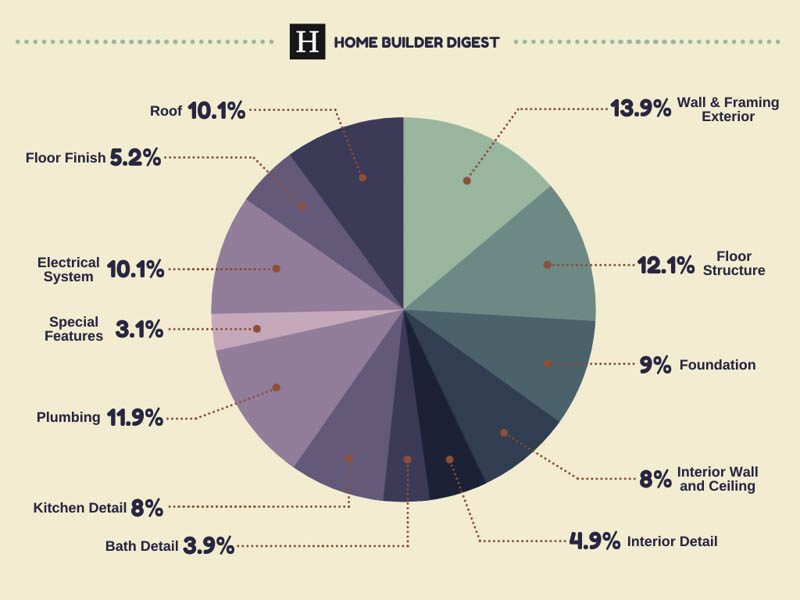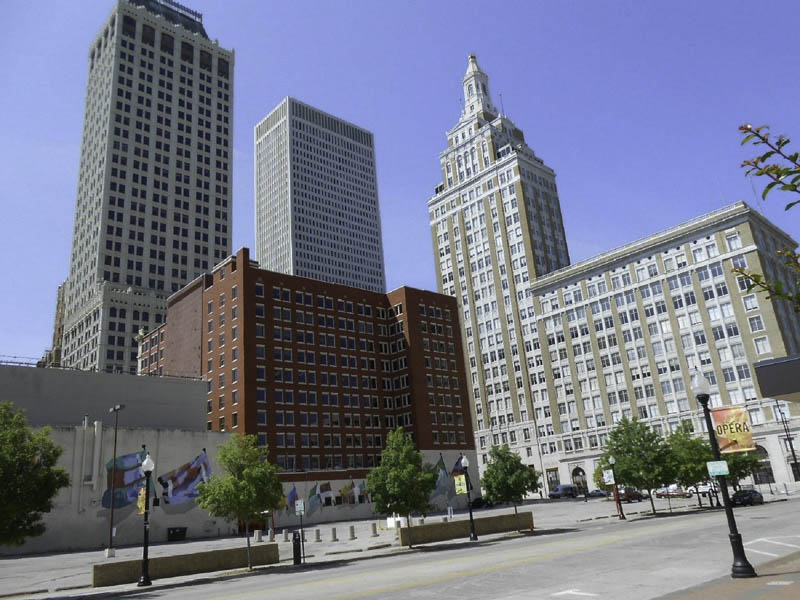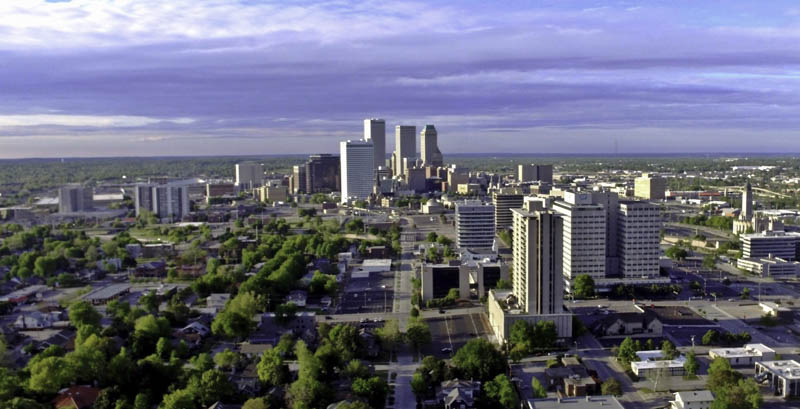Home » Cost Guides » Oklahoma Cost Guides » How Much Does it Cost to Build a House in Tulsa?
Once known as the oil capital of the world, the city of Tulsa has since then grown into a thriving city today. Although the oil and energy industry buoyed its economy, it is now home to various major industries, including aerospace, finance, manufacturing, and technology. Google and Amazon have recently invested in the city and are now planning for expansion. This will bring over 2,000 job opportunities to residents and future Tulsans.
Besides its developing economy, Tulsa is still cheaper than most cities in the country. The city’s cost of living is 8% lower than the national average; more affordable in nearly every major aspect, such as food, utilities, and transportation. This made it more attractive to relocating citizens and brought a steady increase in the city’s population. Last year alone, Tulsa’s population reached more than 1 million residents for the first time; 7,000 of those are new residents.
The Cost of Building a Home in Tulsa

Home Builder Digest estimates that it will cost approximately $400,000 to build a 2,600-square-foot home in the U.S. Fixr suggests a slightly lower value of $358,800. Either price point will give you a standard-built home made with mid-grade materials. As more customization is done to the house, the price point also increases relative to the size, quality of materials, and level of finish.
Home building cost in the city of Tulsa is 25% lower than the national average, with $120 per square foot. This only includes the basic construction and excludes other necessary fees, such as land costs, design fees, and permit fees. The price will increase to $140 per square foot once the listed fees are included. Opting for a more value-conscious approach to home will cost $100-$139 per square foot. On the other hand, making it more luxurious will cost $215 per square foot and more.
Keep in mind that these are only estimates. Values may still increase and decrease as the various issues created by the pandemic are still felt in the construction industry, including supply chain issues and labor shortages. Other factors that affect the overall cost of building a home are separated into two categories: hard costs and soft costs.
Hard Costs
Hard costs refer to all the fees involved in the actual building of the home. These include the materials used, labor fees, extra amenities, and landscaping.
According to HomeBlue, basic home building cost in Tulsa ranges from $90 to $190 per square foot. More specifically, value-conscious homes cost $90 to $120 per square foot. On the other hand, mid-range and high-end homes cost $120-$160 per square foot and $160-$190 per square foot, respectively. The price increases depending on the home’s size, complexity, and materials used. Building a 2,500-square-foot home will land you at approximately $225,000-$475,000, excluding site work, land, and other expenses beyond construction work.
Listed below is an in-depth look at what aspects contribute to the estimate given above (for a 2,5000-square-foot standard quality home):
- Foundation: $13,492
- Floor Structure: $16,000
- Wall Framing and Exterior: $51,267
- Roofing: $10,500
- Interior Detail: $13,175
- Plumbing: $9,081
- Floor Finish: $9,450
- Interior Wall and Ceiling: $14,662
- Bath Detail: $7,102
- Kitchen Detail: $14,662
- Electrical System: $18,442
- Special Features: $5,670
Besides the mentioned features, Oklahoma is within an area where tornadoes are frequently seen — also known as the “Tornado Alley.” Because of this, having a tornado shelter is a highly recommended feature in every home in the state. An extra $2,000-$10,000 is added to the total building cost for purchasing and installing a storm shelter.

Figure 1. Typical cost breakdown of a single-family home constructed using the conventional method, according to Home Builder Digest. Image Source: National Cost Guide.
Soft Costs
Soft costs cover all the expenses that go beyond the home building aspect of the home. These include acquisition of land, permit fees, and architectural or design fees. Most of these are settled on the pre-construction stage, and some are to be paid upon project completion.

Figure 2. Soft cost percentage and average price range of additional fees, determined from the overall cost of custom home building in Tulsa.
Cost of the Land
According to Tulsa’s Municipal Zoning Code, the minimum lot area size required for single family homes is 3,300 to 22,500 square feet. The recommended minimum lot size decreases as the home density increases.
Current residential land listings in the online real estate marketplace Zillow show an average of $287,122 or $6.43 per square foot. The cheapest land available costs $27,000 for a 7,500-square-foot lot which is around $3.60 per square foot. The most expensive land, on the other hand, cost $275,000 for a 9,148-square-foot lot — roughly $30 per square feet.
Following the regulations set by the local government, acquiring land will cost $21,219 – $144,675.
Permits and Other Fees
Before securing a building permit, an application fee must be settled for each building permit passed. The amount to be paid depends on the declared value of the construction, and the corresponding fee is as follows, as per Tulsa’s Municipal Code:
For the building permit, the fee is based on the construction value, and the corresponding fee is as follows:
Other fees required to be settled include a residential certificate of occupancy for new single-family homes for $25, residential zoning clearance permit for $62.50, plumbing permit for $101.10, electrical permit for $203, and mechanical permit for $93.65.
Architecture and Design Fees
Architects and designers charge their services through different methods. Percentage and hourly methods are the commonly used ones. Other methods, such as a hybrid of the two, are used when a negotiation is made between project owners and architects. Fees also differ depending on the experience, expertise, and reputation of designers. Higher design fees are expected with prominent designers compared to fairly new ones.
Residential architects in Tulsa typically charge 8.03% of the total construction cost, as per ProMatcher. Depending on the project, this rate can go as low as 6.42% or as high as 9.64%. Some of the aspects that affect the percentage are the home’s complexity, the intricateness of details, and the scope of work. Supposedly a $350,000-home is being built. The total design fee will land at around $28,105. Any task beyond the agreed arrangement will be charged differently and added to the total design fee.
In terms of the hourly rate, architects typically charge $100 per hour. Basic architectural services usually take 480-600 hours to complete, and the total design fees will be around $48,000-$60,000. Full architectural services require more work; thus, it will take longer. It usually takes about 1,095 hours until completion, and sometimes more. This will result at roughly $110,000 for design fees alone.
How do Tulsa’s custom home building costs compare to other nearby cities?

Aside from being situated in the country’s cheapest region, Oklahoma is also among the South’s low-cost states. According to Business Insider, Oklahoma has a median home value of only $106 per square foot, making it the 11th cheapest state in the region — 81% cheaper than the most expensive state Washington D.C. and 10% more expensive than the cheapest state Mississippi.
Home building costs across the cities in Oklahoma are relatively the same with Tulsa. Listed below is the price per square foot of each, as recorded by HowMuchly:
- Muskogee: $106 per square foot
- Ponca City: $111 per square foot
- Stillwater: $111 per square foot
- Edmond: $114 per square foot
- Norman: $114 per square foot
- Oklahoma City: $114 per square foot
- Enid: $115 per square foot
- Lawton: $115 per square foot
The trend continues with the current home listings on the real estate marketplace Realtor.com. According to the site, homes in the Tulsa Metro Area — Tulsa-Broken Arrow-Owasso — have a median home price of $128 per square foot. To be more specific, the average home listing price in Tulsa is $120 per square foot. For Broken Arrow and Owasso, the average home listing price is $127 per square foot and $137 per square foot, respectively.
What Leading Custom Home Builders and Architects that Serve the Tulsa Area Say
We reached out to some of the best construction and architectural firms serving Tulsa to get their insights regarding the city’s construction industry. They were also asked to share the price range for their services to help confirm the values given above.

According to Mike Fournier, owner of Sonrise Construction, it is hard to give a definitive price on the cost per square foot without seeing the plans first. He expressed that the size of the home alone is not enough to gauge how much it will cost to build. Multiple factors are to be considered before builders can put a price. With regards to the status of the construction industry, Mike shared that significant delays in the building timeline are still being felt since the supply chain disruptions started. Before the pandemic, homes were built within 3-9 months. Today, it will take 5-15 months before it is completed. Also making it more difficult is the labor shortage across the country. The industry needs skilled artisans and craftsmen to supply the high demand. Until a solution is given, it is expected that delays are still going to be experienced while waiting for qualified laborers.
Robert Kleven, a manager/broker at Concept Builders, Inc., shared the firm’s service fees. Robert explained that the firm starts with a base price. From there, they will add the costs for customization, which can usually range from $25,000-$200,000 in add-ons. Based on the firm’s recent projects, their smaller and entry-level homes typically cost $180, and the mid-level homes cost $200 per square foot. On the other hand, higher-end homes are estimated to be around $275 per square, which may rise to $390 depending on the location and customization. Robert expressed that it has been challenging to stay in front of the recent price surge due to the industry’s volatility. Despite that, the firm is trying its best not to put the weight of price escalation on the clients. Robert also explained that the values given are only estimates, and the prices may vary from the actual cost once the project is completed.
The Future of Tulsa’s Residential Construction Industry

Single family homes take up 73% of Tulsa’s housing units, and their values have significantly inflated over the past year. According to Zillow’s Home Value Index, homes are valued at $166,000 as of December 2020 and roughly increase by 17% as of December 2021 — currently valued at $194,000. This is brought by the effects of the pandemic that trickles down to various industry issues, including supply chain issues and labor shortages. These issues brought a 4% increase in construction costs, and experts believe it will increase even further, from 4 to 7% in total. More delays and longer waiting times are expected until these issues stabilize. As the construction industry remains volatile, it is recommended for project owners to secure a contract and pricing now to avoid sudden expense increases in the future.
High demand also affects the price surge in the real estate market. With more people realizing their needs, homeowners now look for a myriad of ways to improve their homes. Some do DIYs or renovations, and some opt to relocate to cheaper cities and buy homes more suitable for them. Unfortunately, home supplies are still historically low. It only takes eight days for a home in Tulsa to be sold for the full asking price. This brought an increase in median sales price up to 11.33% year-over-year. The construction industry is also having difficulty meeting building demand because of the issues mentioned above. This led experts to believe that home sales price in Tulsa is expected to progressively increase until solved.
Considering building a home in Tulsa?
Contact us for a free consultation
